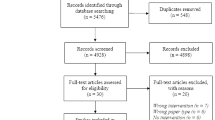Abstract
The preponderance of research conducted on supported employment has focused on the structure of interventions with little empirical investigation into the contribution of employment specialists to work outcomes. Using a participatory approach, we identified competencies essential to the role of the employment specialists, operationalized and refined those competencies using the perspectives of experts, service recipients, and employment specialists themselves. We conducted an online survey with 34 candidate items and n = 142 respondents. Results suggested good psychometric properties, stability and coherence of the Vocational Practices and Relationship Scale. A total of n = 23 final items tapping the working alliance coalesced into a strong factor, as did strategies for promoting vocational recovery, suggesting that the scale warrants wide-scale testing for predictive validity. We consider these constructs and competencies to be a potential blueprint for training employment specialists, not only in technical skills and strategies, but also to increase the hope for vocational recovery among those they serve.
Similar content being viewed by others
References
Anthony, W. A., Cohen, M., Farkas, M., & Gagne, C. (2002). Psychiatric rehabilitation (2nd ed.). Boston, MA: Boston University, Center for Psychiatric Rehabilitation.
Corbière, M., Brouwers, E., Lanctôt, N., & van Weeghel, J. (2014). Employment specialist competencies for supported employment programs.
Corbière, M., Lecomte, T., Reinharz, D., Kirsh, B., Goering, P., Menear, M., … Goldner, E. (2017). Predictors of Acquisition of Competitive Employment for People Enrolled in Supported Employment Programs. Journal of Nervous and Mental Disease, 205(4), 275-282
de Pierrefeu, I., Corbière, M., & Pachoud, B. (2017). Vocational counselors in France: Comparison to competencies of employment specialists working in Canadian IPS programs. Community Mental Health Journal,53, 871–877. https://doi.org/10.1007/s10597-017-0109-8.
Drake, R. E., Bond, G. R., & Becker, D. R. (2012). Individual placement and support: An evidence-based approach to supported employment. New York: Oxford University Press.
Drake, R. E., Bond, G. R., Goldman, H. H., Hogan, M. F., & Karakus, M. (2016). Individual placement and support services boost employment for people with serious mental illnesses, but funding is lacking. Health Affairs,35(6), 1098–1105. https://doi.org/10.1377/hlthaff.2016.0001.
Dreher, K. C., Bond, G. R., & Becker, D. R. (2010). Creation of a measure to assess knowledge of the individual placement and support model. Psychiatric Rehabilitation Journal,33(3), 181–189. https://doi.org/10.2975/33.3.2010.181.189.
Goldberg, S. B., Hoyt, W. T., Nissen-Lie, H. A., Nielsen, S. L., & Wampold, B. E. (2016). Unpacking the therapist effect: Impact of treatment length differs for high- and low-performing therapists. Psychotherapy Research. https://doi.org/10.1080/10503307.2016.1216625.
Horvath, A. O. (2005). The therapeutic relationship: Research and theory: An introduction to the special issue. Psychotherapy Research,15(1–2), 3–7.
Horvath, A. O., & Greenberg, L. S. (1994). The working alliance: Theory, research, and practice. New York: Wiley.
Luciano, A., Bond, G. R., Drake, R. E., & Becker, D. (2014). Is high fidelity to supported employment equally attainable in small and large communities? Community Mental Health Journal,50, 46–50. https://doi.org/10.1007/s10597-013-9687-2.
Palpacuer, C., Gallet, L., Drapier, D., Reymann, J. M., Falissard, B., & Naudet, F. (2017). Specific and non-specific effects of psychotherapeutic interventions for depression: Results from a meta-analysis of 84 studies. Journal of Psychiatric Research,87, 95–104. https://doi.org/10.1016/j.jpsychires.2016.12.015.
Qualtrics Software. (2013). Qualtrics web based survey tool. Copyright 2019 Qualtrics. Qualtrics and all other Qualtrics product or service names are registered trademarks or trademarks of Qualtrics, Provo, UT, USA. http://www.qualtrics.com. Accessed 12 December, 2015.
Rogers, C. (1975). Empathic: An unappreciated way of being. The Counseling Psychologist,5(2), 2–10.
Rogers, C. (2007). The necessary and sufficient conditions of therapeutic personality change. Psychotherapy: Theory, Research, Practice, Training,44(3), 240–248.
Russinova, Z., Rogers, E. S., Cook, K. F., Ellison, M. L., & Lyass, A. (2013). Conceptualization and measurement of mental health specialists’ recovery-promoting competence: The recovery promoting relationships scale (RPRS). Psychiatric Rehabilitation Journal,36(1), 7–14. https://doi.org/10.1037/h0094741.
Russinova, Z., Rogers, E. S., Ellison, M. L., & Luass, A. (2011). Recovery-promoting professional competencies: Perspectives of mental health consumers, consumer-specialists and specialists. Psychiatric Rehabilitation Journal,34(3), 177–185. https://doi.org/10.2975/34.3.2011.177.185.
Individual Placement and Support Employment Center. (2018). Retrieved December 15, 2018 from https://ipsworks.org/.
Taylor, A. C., & Bond, G. R. (2014). Employment specialist competencies as predictors of employment outcomes. Community Mental Health Journal,50(1), 31–40. https://doi.org/10.1007/s10597-012-9554-6.
Truax, C. B., & Carkhuff, R. R. (2007). Toward effective counseling and psychotherapy: Training and practice. New Brunswick: Aldine Transaction Publishers.
Wampold, B. E. (2015). How important are the common factors in psychotherapy? An update. World Psychiatry,14(3), 270–277. https://doi.org/10.1002/wps.20238.
Wampold, B., & Imel, Z. (2015). The great psychotherapy debate: The research evidence for what works in psychotherapy. New York, NY: Routledge.
Whitley, R., Kostick, K. M., & Bush, P. W. (2010). Desirable characteristics and competencies of supported employment specialists: An empirically-grounded framework. Administration and Policy in Mental Health and Mental Health Services Research,37(6), 509–519. https://doi.org/10.1007/s10488-010-0297-9.
Willis, G. B. (2014). Cognitive interviewing: A tool for improving questionnaire design. Thousand Oaks, CA: Sage Publishing.
Acknowledgements
This paper was developed with support from the National Institute on Disability, Independent Living, and Rehabilitation Research ARRT 90AR5018 as well as the Dudley Allen Sargent Research Fund of Sargent College at Boston University. NIDILRR is a Center within the Administration for Community Living (ACL), Department of Health and Human Services (HHS). The contents of this project do not necessarily represent the policy of NIDILRR, ACL, SAMHSA, or HHS, and you should not assume endorsement by the Federal Government. The authors are grateful for their support.
Author information
Authors and Affiliations
Corresponding author
Ethics declarations
Conflict of interest
The authors have no conflicts.
Additional information
Publisher's Note
Springer Nature remains neutral with regard to jurisdictional claims in published maps and institutional affiliations.
Rights and permissions
About this article
Cite this article
Teixeira, C., Rogers, E.S., Russinova, Z. et al. Defining Employment Specialist Competencies: Results of a Participatory Research Study. Community Ment Health J 56, 440–447 (2020). https://doi.org/10.1007/s10597-019-00497-3
Received:
Accepted:
Published:
Issue Date:
DOI: https://doi.org/10.1007/s10597-019-00497-3




